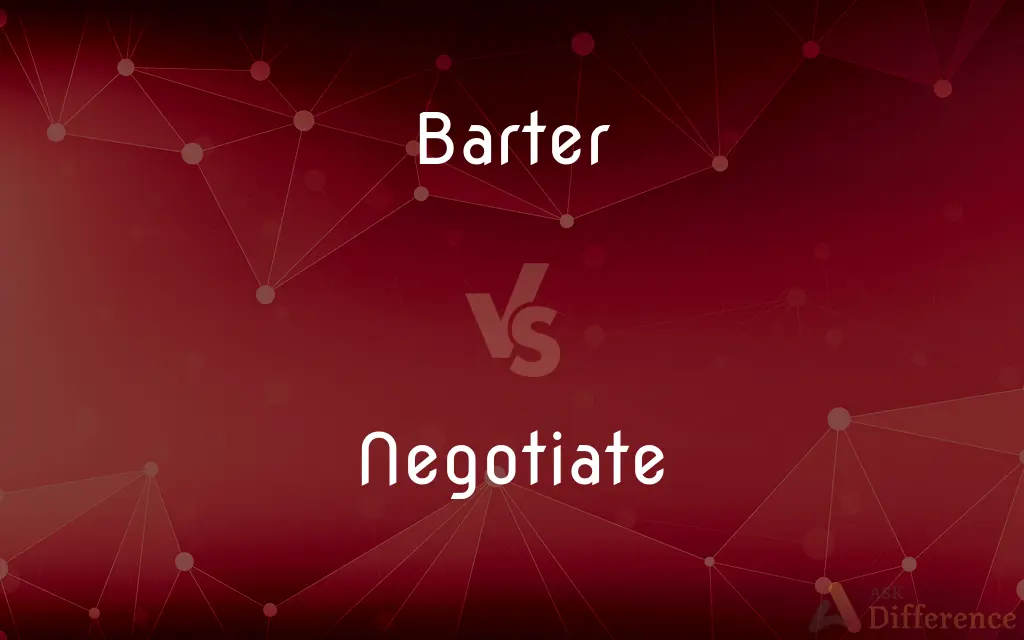Barter vs. Negotiate — What's the Difference?
By Fiza Rafique & Urooj Arif — Updated on April 26, 2024
Barter involves exchanging goods or services without using money, focusing on direct trade, whereas negotiate refers to discussions aimed at reaching an agreement, applicable to various contexts including trade.

Difference Between Barter and Negotiate
Table of Contents
ADVERTISEMENT
Key Differences
Barter is a transaction method where parties exchange goods or services directly without the intermediary of money, highlighting a practice common in pre-currency economies. On the other hand, negotiate involves communication and discussion to reach a mutual agreement, which can involve aspects like price, terms, or conditions in both monetary and non-monetary exchanges.
While bartering requires a mutual interest in the goods or services offered by each party, effectively limiting its scope to scenarios where both parties have something the other wants, negotiating can occur in almost any decision-making process, whether commercial, legal, or personal, and does not inherently require an exchange of goods.
Barter transactions are typically straightforward, where the goods or services are directly exchanged, and the value is subjectively determined by the participants. Conversely, negotiations often involve more complex elements such as bargaining, compromise, and sometimes the involvement of multiple parties or intermediaries.
The barter system does not involve monetary valuation or financial instruments, which can make it less flexible but simpler in certain contexts, like small communities or closed ecosystems. Negotiation, however, is adaptable to a wide range of situations, including financial deals, where monetary values and formal agreements are common.
In bartering, the success of the transaction heavily relies on the immediate utility and need for the offered goods or services, whereas negotiation processes can be used to address broader and more strategic outcomes, including long-term contracts, salaries, or even international treaties, where the immediate exchange of goods or services is not always the focus.
ADVERTISEMENT
Comparison Chart
Definition
Exchange of goods or services without money
Discussion aimed at reaching an agreement
Primary Purpose
Direct trade
Reach consensus or agreement
Usage Context
Limited to where parties have reciprocal needs
Broad, including business, legal, personal
Complexity
Generally straightforward
Can be complex, involving multiple aspects
Dependency on Currency
Does not use currency
May involve or not involve currency
Compare with Definitions
Barter
A method of exchange where goods or services are traded directly.
They decided to barter fruit for services to maintain their garden.
Negotiate
The process of bargaining to settle differences.
He negotiated a better price for his new car.
Barter
A trade system not involving money.
In some cultures, barter systems are still prevalent for daily needs.
Negotiate
A method to influence or persuade in decision-making.
She negotiated with suppliers to get the best rates.
Barter
An economic concept where direct exchange occurs.
Barter often simplifies transactions in remote areas.
Negotiate
An interaction aimed at solving a dispute.
The union and management are negotiating to avoid a strike.
Barter
An arrangement to swap items of perceived equal value.
Kids often barter snacks at school to get their preferred treats.
Negotiate
To arrange or achieve by conferencing, bargaining, and compromising.
Negotiating peace treaties requires skilled diplomacy.
Barter
A reciprocal trading agreement.
The artists bartered paintings for studio space.
Negotiate
To discuss terms in order to reach a mutual agreement.
They needed to negotiate the contract details thoroughly.
Barter
In trade, barter (derived from baretor) is a system of exchange in which participants in a transaction directly exchange goods or services for other goods or services without using a medium of exchange, such as money. Economists distinguish barter from gift economies in many ways; barter, for example, features immediate reciprocal exchange, not one delayed in time.
Negotiate
Obtain or bring about by discussion
He negotiated a new contract with the sellers
Barter
Exchange (goods or services) for other goods or services without using money
He often bartered a meal for drawings
They were able to buy or barter for most of what they needed
Negotiate
Find a way over or through (an obstacle or difficult route)
She cautiously negotiated the hairpin bend
Barter
The action or system of bartering
Paper money ceases to have any value and people resort to barter
Negotiate
Transfer (a cheque, bill, or other document) to the legal ownership of another person, who thus becomes entitled to any benefit.
Barter
To trade goods or services without the exchange of money.
Negotiate
To confer with another or others in order to come to terms or reach an agreement
"It is difficult to negotiate where neither will trust" (Samuel Johnson).
Barter
To trade (goods or services) without the exchange of money.
Negotiate
To arrange or settle by discussion and mutual agreement
Negotiate a contract.
Barter
The act or practice of bartering.
Negotiate
To transfer (an instrument, such as a promissory note) to another party by means of endorsement.
Barter
Something bartered.
Negotiate
To succeed in going over or through
Negotiate a sharp curve.
Barter
Of, relating to, or being something based on bartering
A barter economy.
Negotiate
To succeed in accomplishing or managing
Negotiate a difficult musical passage.
Barter
An exchange of goods or services without the use of money.
We had no money so we had to live by barter.
Negotiate
(intransitive) To confer with others in order to come to terms or reach an agreement.
Barter
The goods or services used in such an exchange.
The man used his watch as barter to pay for his tab.
Negotiate
(transitive) To arrange or settle something by mutual agreement.
We negotiated the contract to everyone's satisfaction.
The client and server computers must first negotiate a network protocol to be used.
Barter
(ambitransitive) To exchange goods or services without involving money.
She bartered a bonsai for one of the rare books in my library.
You may be able to barter for some of the items you need at the local market.
Negotiate
(transitive) To succeed in coping with, or getting over something.
We negotiated the mountain track with difficulty.
Although the car was quite rickety, he could negotiate the curves very well.
Barter
To traffic or trade, by exchanging one commodity for another, in distinction from a sale and purchase, in which money is paid for the commodities transferred; to truck.
Negotiate
(transitive) To transfer to another person with all the rights of the original holder; to pass, as a bill.
Barter
To trade or exchange in the way of barter; to exchange (frequently for an unworthy consideration); to traffic; to truck; - sometimes followed by away; as, to barter away goods or honor.
Negotiate
(obsolete) To transact business; to carry on trade.
Barter
The act or practice of trafficking by exchange of commodities; an exchange of goods.
The spirit of huckstering and barter.
Negotiate
(obsolete) To intrigue; to scheme.
Barter
The thing given in exchange.
Negotiate
To transact business; to carry on trade.
Barter
An equal exchange;
We had no money so we had to live by barter
Negotiate
To treat with another respecting purchase and sale or some business affair; to bargain or trade; as, to negotiate with a man for the purchase of goods or a farm.
Barter
Exchange goods without involving money
Negotiate
To hold intercourse respecting a treaty, league, convention, or other proposed agreement; to treat with, respecting peace or commerce; to conduct communications or conferences.
He that negotiates between God and manIs God's ambassador.
Negotiate
To intrigue; to scheme.
Negotiate
To carry on negotiations concerning; to procure or arrange for by negotiation; as, to negotiate peace, or an exchange.
Constantinople had negotiated in the isles of the Archipelago . . . the most indispensable supplies.
Negotiate
To transfer for a valuable consideration under rules of commercial law; to sell; to pass.
The notes were not negotiated to them in the usual course of business or trade.
Negotiate
Discuss the terms of an arrangement;
They negotiated the sale of the house
Common Curiosities
What is the main difference between barter and negotiate?
Barter involves direct exchange without money, while negotiate involves discussions to reach an agreement.
Can you negotiate in a barter transaction?
Yes, negotiation can be part of bartering to agree on the terms of the exchange.
Are negotiation skills important in business?
Yes, being able to negotiate effectively is crucial in many aspects of business.
Is barter still used today?
Yes, though less common, barter is still used in certain areas and communities.
Can barter involve services as well as goods?
Yes, barter can include both services and goods in the exchange.
Do all negotiations lead to an agreement?
No, negotiations can fail if the parties are unable to reach a satisfactory agreement.
How does culture affect negotiation practices?
Cultural norms and values can significantly influence how negotiations are conducted.
Can negotiation resolve conflicts?
Yes, negotiation is a common method to resolve various conflicts.
Are bartering and negotiation mutually exclusive?
No, negotiation can be part of the bartering process, facilitating fair exchanges and resolving differences.
What skills are essential for effective negotiation?
Effective communication, empathy, and strategic thinking are key negotiation skills.
Share Your Discovery

Previous Comparison
Passover vs. Eucharist
Next Comparison
Sheriff vs. DeputyAuthor Spotlight
Written by
Fiza RafiqueFiza Rafique is a skilled content writer at AskDifference.com, where she meticulously refines and enhances written pieces. Drawing from her vast editorial expertise, Fiza ensures clarity, accuracy, and precision in every article. Passionate about language, she continually seeks to elevate the quality of content for readers worldwide.
Co-written by
Urooj ArifUrooj is a skilled content writer at Ask Difference, known for her exceptional ability to simplify complex topics into engaging and informative content. With a passion for research and a flair for clear, concise writing, she consistently delivers articles that resonate with our diverse audience.












































